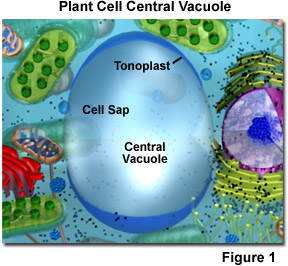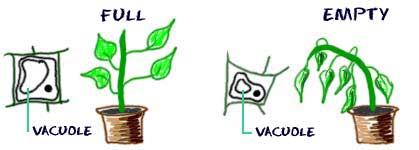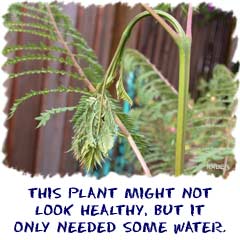Animal Cell Vacuole Biography
Source:- Google.com.pk
vac·u·ole (văk′yo̅o̅-ōl′)
n.
A small cavity in the cytoplasm of a cell, bound by a single membrane and containing water, food, or metabolic waste.
[French, from Latin vacuus, empty; see vacuum.]
vac′u·o′lar (-ō′lər, -lär′) adj.
vac′u·o·la′tion n.
The American Heritage® Dictionary of the English Language, Fourth Edition copyright ©2000 by Houghton Mifflin Company. Updated in 2009. Published by Houghton Mifflin Company. All rights reserved.
vacuole (ˈvækjʊˌəʊl)
n
1. (Biology) biology a fluid-filled cavity in the cytoplasm of a cell
[C19: from French, literally: little vacuum, from Latin vacuum]
ˌvacuˈolar adj vacuolate adj vacuolation n
Collins English Dictionary – Complete and Unabridged © HarperCollins Publishers 1991, 1994, 1998, 2000, 2003
vac•u•ole (ˈvæk yuˌoʊl)
n.
1. a membrane-bound cavity within a cell, often containing a watery liquid or secretion..
2. a minute cavity or vesicle in organic tissue.
[1850–55; < French; see vacuum, -ole1]
vac•u•o•lar (ˌvæk yuˈoʊ lər, ˈvæk yu ə-, ˈvæk yə lər) adj.
Random House Kernerman Webster's College Dictionary, © 2010 K Dictionaries Ltd. Copyright 2005, 1997, 1991 by Random House, Inc. All rights reserved.
vacuole (văk′yo̅o̅-ōl′)
A cavity within the cytoplasm of a cell, surrounded by a single membrane and containing fluid, food, or metabolic waste. Vacuoles are found in the cells of plants, protists, and some primitive animals. In mature plant cells, there is usually one large vacuole which occupies a large part of the cell's volume and is filled with a liquid called cell sap. The cell sap stores food reserves, pigments, defensive toxins, and waste products to be expelled or broken down. In the cells of protists, however, there may be many small specialized vacuoles, such as digestive vacuoles for the absorption of captured food and contractile vacuoles for the expulsion of excess water or wastes
Share:
This page:
Share:
On this page
Thesaurus
Translations
Word Browser
Advertisement (Bad banner? Please let us know)
cell (sĕl)
n.
1. A narrow confining room, as in a prison or convent.
2. A small enclosed cavity or space, such as a compartment in a honeycomb or within a plant ovary or an area bordered by veins in an insect's wing.
3. Biology The smallest structural unit of an organism that is capable of independent functioning, consisting of one or more nuclei, cytoplasm, and various organelles, all surrounded by a semipermeable cell membrane.
4. Architecture See web.
5. The smallest organizational unit of a centralized group or movement, especially of a political party of Leninist structure.
6. Electricity
a. A single unit for electrolysis or conversion of chemical into electric energy, usually consisting of a container with electrodes and an electrolyte; a battery. Also called electrochemical cell.
b. A single unit that converts radiant energy into electric energy: a solar cell.
7. A fuel cell.
8. Computer Science A basic unit of storage in a computer memory that can hold one unit of information, such as a character or word.
9. A geographic area or zone surrounding a transmitter in a cellular telephone system.
10. A storm cell.
11. A small humble abode, such as a hermit's cave or hut.
12. A small religious house dependent on a larger one, such as a priory within an abbey.
13. A box or other unit on a spreadsheet or similar array at the intersection of a column and a row.
v. celled, cell·ing, cells
v.tr.
To store in a honeycomb.
v.intr.
To live in or share a prison cell.
[Middle English celle, from Old English cell and from Old French, both from Latin cella, chamber; see kel-1 in Indo-European roots.]
click for a larger image
cell
top: plant cell
bottom: animal cell
The American Heritage® Dictionary of the English Language, Fourth Edition copyright ©2000 by Houghton Mifflin Company. Updated in 2009. Published by Houghton Mifflin Company. All rights reserved.
cell (sɛl)
n
1. a small simple room, as in a prison, convent, monastery, or asylum; cubicle
2. any small compartment: the cells of a honeycomb.
3. (Biology) biology the basic structural and functional unit of living organisms. It consists of a nucleus, containing the genetic material, surrounded by the cytoplasm in which are mitochondria, lysosomes, ribosomes, and other organelles. All cells are bounded by a cell membrane; plant cells have an outer cell wall in addition
4. (Biology) biology any small cavity or area, such as the cavity containing pollen in an anther
5. (General Physics) a device for converting chemical energy into electrical energy, usually consisting of a container with two electrodes immersed in an electrolyte. See also primary cell, secondary cell, dry cell, wet cell, fuel cell
6. (Chemistry) short for electrolytic cell
7. (Ecclesiastical Terms) a small religious house dependent upon a larger one
8. (Government, Politics & Diplomacy) a small group of persons operating as a nucleus of a larger political, religious, or other organization: Communist cell.
9. (Mathematics) maths a small unit of volume in a mathematical coordinate system
10. (Zoology) zoology one of the areas on an insect wing bounded by veins
11. (Broadcasting) the geographical area served by an individual transmitter in a cellular radio network
[C12: from Medieval Latin cella monk's cell, from Latin: room, storeroom; related to Latin cēlāre to hide]
ˈcell-ˌlike adj
Collins English Dictionary – Complete and Unabridged © HarperCollins Publishers 1991, 1994, 1998, 2000, 2003
cell (sɛl)
n.
1. a small room, as in a convent or prison.
2. any of various small compartments or bounded areas forming part of a whole.
3. a usu. microscopic structure containing nuclear and cytoplasmic material enclosed by a semipermeable membrane and, in plants, a cell wall; the basic structural unit of all organisms.
4. a small group acting as a unit within a larger organization: a local cell of a political party.
5. a device that converts chemical energy into electricity, usu. consisting of two different kinds of conductors surrounded by an electrolyte; battery.
6. Also called electrolytic cell. a device for producing electrolysis, consisting essentially of the electrolyte, its container, and the electrodes.
7. a monastery or nunnery, dependent on a larger religious house.
8. one of the areas into which the wing of an insect is divided by the veins.
9. locule.
10. one of the separate areas covered by a radio transmitter in a cellular phone system.
[before 1150; Middle English celle (< Old French), Old English cell < Medieval Latin cella monastic cell, Latin: room; see cella]
Random House Kernerman Webster's College Dictionary, © 2010 K Dictionaries Ltd. Copyright 2005, 1997, 1991 by Random House, Inc. All rights reserved
Animal Cell Vacuole Animal Cell Model Diagram Project Parts Structure Labeled Coloring and Plant Cell Organelles Cake


Animal Cell Vacuole Animal Cell Model Diagram Project Parts Structure Labeled Coloring and Plant Cell Organelles Cake


Animal Cell Vacuole Animal Cell Model Diagram Project Parts Structure Labeled Coloring and Plant Cell Organelles Cake


Animal Cell Vacuole Animal Cell Model Diagram Project Parts Structure Labeled Coloring and Plant Cell Organelles Cake


Animal Cell Vacuole Animal Cell Model Diagram Project Parts Structure Labeled Coloring and Plant Cell Organelles Cake


Animal Cell Vacuole Animal Cell Model Diagram Project Parts Structure Labeled Coloring and Plant Cell Organelles Cake


Animal Cell Vacuole Animal Cell Model Diagram Project Parts Structure Labeled Coloring and Plant Cell Organelles Cake


Animal Cell Vacuole Animal Cell Model Diagram Project Parts Structure Labeled Coloring and Plant Cell Organelles Cake

Animal Cell Vacuole Animal Cell Model Diagram Project Parts Structure Labeled Coloring and Plant Cell Organelles Cake


Animal Cell Vacuole Animal Cell Model Diagram Project Parts Structure Labeled Coloring and Plant Cell Organelles Cake


Animal Cell Vacuole Animal Cell Model Diagram Project Parts Structure Labeled Coloring and Plant Cell Organelles Cake
No comments:
Post a Comment